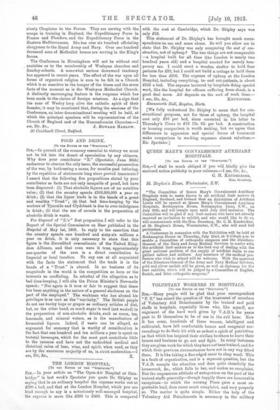FOOD AND DRINK.
[To MN EDITOR 01 THE " SPXOTATOR."1 SIR,—In pursuit of the economy essential to victory we must not be led into the desert of speculation by any chimera. Why does your contributor "Z." (Spectator, June 26th) endeavour to obscure the only issue, the successful prosecution of the war, by buttressing a cause, for months past tottering, by the repetition of statements long since proved inaccurate ? I assert that the following five propositions stated by your contributor as facts are not only incapable of proof, but have been disproved : (1) That alcoholic liquors are of no nutritive value ; (2) that the country spends £166,000,000 a year on drink ; (3) that the liquor trade is in the hands of a great and wealthy "Trust" ; (4) that bad time-keeping by the workers of Tyneside and Clydebank is due to over-indulgence in drink ; (5) that the use of cereals in the preparation of alcoholic drink is waste.
For disproof of " Z.'s " first proposition I will refer to the Report of the Special Commission on Beer published in the Hospital of May let, 1909. In reply to the assertion that the country spends one hundred and sixty-six millions a year on drink, it is only necessary to state that this figure is the discredited overestimate of the United King- dom Alliance, and that even were it true, approximately one-quarter of the sum is a direct contribution to Imperial or local taxation. To any one at all acquainted with the facts the statement that the trade is in the hands of a " Trust" is absurd. In no business of its magnitude in the world is the competition so keen or the interests so conflicting. In rebuttal of the allegation as to bad time-keeping, I will cite the Prime Minister's Newcastle speech: "Nor again is it true or fair to suggest that there has been anything in the nature of a general slackness on the part of the employed." The workman who has abused his privileges is as rare as the " war-baby." The British people do not use barley hops or grapes as ordinary articles of diet, but, on the other hand, as much sugar is used (not wasted) in the preparation of non-alcoholic drinks, such as cocoa, tea, lemonade, and mineral waters, all in the manufacture of fermented liquors. Indeed, if waste can be alleged, an argument for economy that is worthy of consideration is the fact that one hundred and ten millions a year is spent on teetotal beverages, which for the most part contribute little to the revenue and have not the undoubted medical and dietetical value of beer, wine, and spirit, when used, as they are by the enormous majority of us, in strict moderation.---I


































 Previous page
Previous page